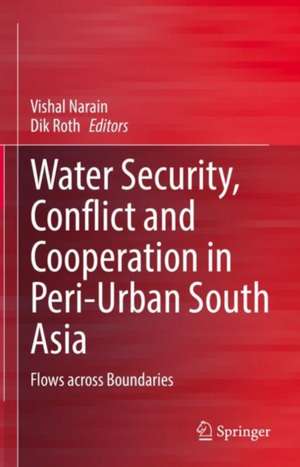Water Security, Conflict and Cooperation in Peri-Urban South Asia: Flows across Boundaries
Editat de Vishal Narain, Dik Rothen Limba Engleză Paperback – 10 dec 2021
| Toate formatele și edițiile | Preț | Express |
|---|---|---|
| Paperback (1) | 178.99 lei 3-5 săpt. | +20.63 lei 7-13 zile |
| Springer International Publishing – 10 dec 2021 | 178.99 lei 3-5 săpt. | +20.63 lei 7-13 zile |
| Hardback (1) | 430.79 lei 3-5 săpt. | |
| Springer International Publishing – 10 dec 2021 | 430.79 lei 3-5 săpt. |
Preț: 178.99 lei
Nou
Puncte Express: 268
Preț estimativ în valută:
34.25€ • 35.76$ • 28.35£
34.25€ • 35.76$ • 28.35£
Carte disponibilă
Livrare economică 14-28 martie
Livrare express 28 februarie-06 martie pentru 30.62 lei
Preluare comenzi: 021 569.72.76
Specificații
ISBN-13: 9783030790370
ISBN-10: 3030790371
Pagini: 180
Ilustrații: XIX, 180 p. 1 illus.
Dimensiuni: 155 x 235 x 18 mm
Greutate: 0.35 kg
Ediția:1st ed. 2022
Editura: Springer International Publishing
Colecția Springer
Locul publicării:Cham, Switzerland
ISBN-10: 3030790371
Pagini: 180
Ilustrații: XIX, 180 p. 1 illus.
Dimensiuni: 155 x 235 x 18 mm
Greutate: 0.35 kg
Ediția:1st ed. 2022
Editura: Springer International Publishing
Colecția Springer
Locul publicării:Cham, Switzerland
Cuprins
Chapter 1 Introduction: Peri-Urban Water Security in South Asia.- Chapter 2 A New Imagination for Waste and Water in India’s Peri-Urban Interface.- Chapter 3 From Royal Canal to Neglected Canal? Changing Use and Management of a Traditional Canal Irrigation System in Peri-Urban Kathmandu Valley.- Chapter 4 Public Lives, Private Water: Female Ready-Made Garment Factory Workers in Peri-Urban Bangladesh.- Chapter 5 Digging Deeper: Deep Wells, Bore-Wells and Water Tankers in Peri-Urban Hyderabad.- Chapter 6 Changing Agriculture and Climate Variability in Peri-Urban Gurugram, India.- Chapter 7 Views from the Sluice Gate: Water Insecurity, Conflict and Cooperation in Peri-Urban Khulna, Bangladesh.- Chapter 8 Interventions to Strengthen Institutional Capacity for Peri-Urban Water Management in South Asia.- Chapter 9 Concluding Reflections: Towards Alternative Peri-Urban Futures?.
Notă biografică
Vishal Narain is Professor Public Policy and Governance at the Management Development Institute, Gurgaon, India. He holds a PhD from Wageningen University, the Netherlands. His academic interests are the interdisciplinary analysis of public policy processes and institutions, water governance, vulnerability and adaptation to environmental change, as well as peri-urban issues. He is the author of Public Policy: a view from the South (Cambridge University Press, 2018) and Institutions, technology and water control: water users associations and irrigation management reform in two large-scale systems in India (Orient Longman, 2003), for which he received the S.R. Sen Prize for the Best Book on agricultural economics and rural development conferred by the Indian Society for Agricultural Economics. He has been a consultant to several organizations such as the Food and Agricultural Organization (FAO) Bangkok; International Water Management Institute (IWMI), Colombo; theAsia Foundation, New Delhi, India; and SaciWATERs, Hyderabad, India.
Dik Roth is a social anthropologist and Associate Professor at the Sociology of Development and Change group of Wageningen University, the Netherlands. He holds an MSc from the University of Amsterdam and a PhD in Social Sciences from Wageningen University. His scientific interests include the anthropology of law and legal pluralism, policy processes, critical development studies, the management and governance of natural resources, resource-related conflicts, and flood risk management policies. His work includes research programmes and activities in Indonesia, India, Nepal, Bangladesh and the Netherlands. He has widely published on various topics in international peer-reviewed scientific journals. He co-edited Liquid Relations. Contested water rights and legal complexity (Rutgers University Press, 2005) and Controlling the water. Matching technology and institutions in irrigation management in India and Nepal (Oxford University Press, 2013).
Dik Roth is a social anthropologist and Associate Professor at the Sociology of Development and Change group of Wageningen University, the Netherlands. He holds an MSc from the University of Amsterdam and a PhD in Social Sciences from Wageningen University. His scientific interests include the anthropology of law and legal pluralism, policy processes, critical development studies, the management and governance of natural resources, resource-related conflicts, and flood risk management policies. His work includes research programmes and activities in Indonesia, India, Nepal, Bangladesh and the Netherlands. He has widely published on various topics in international peer-reviewed scientific journals. He co-edited Liquid Relations. Contested water rights and legal complexity (Rutgers University Press, 2005) and Controlling the water. Matching technology and institutions in irrigation management in India and Nepal (Oxford University Press, 2013).
Textul de pe ultima copertă
This open access book explores the implications of urbanization in South Asia for water (in-) security in the peri-urban spaces of Dhaka and Khulna in Bangladesh, Bengaluru, Gurugram, Hyderabad, Kolkata and Pune in India, and Kathmandu Valley in Nepal. The book looks into specifically peri-urban water security issues in a context of rapid urbanization and social-environmental changes, including the changing climate and its emerging impacts. It demonstrates how urbanization processes change water flows between rural and urban areas, the implications of this processes for the water security of peri-urban populations, and how new institutions and technologies develop to mediate the relationships between peri-urban communities and water. The book seeks to further the debate on peri-urban water security, including what constitutes the peri-urban, socially differentiated access to water in peri-urban spaces, interventions for improving water access, and emerging forms of cooperation and conflict related to water access in a context of urbanization and climate change. As such, this book is an interesting read for academics with various disciplinary backgrounds, professionals working in the worlds of national and international policy, NGOs, activist groups, research and development institutes, and individual readers interested in water security and urbanization.
Caracteristici
This open access book focuses on water security in rapidly growing peri-urban spaces in the global south Provides in-depth insights on how changes in water security are locally experienced and acted upon Links empirical investigations and descriptive accounts to relevant theoretical approaches Disciplinary boundaries crossing by drawing from a wide range of professional backgrounds from the South and the North
